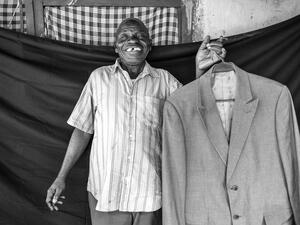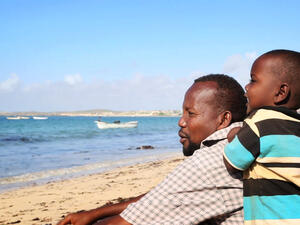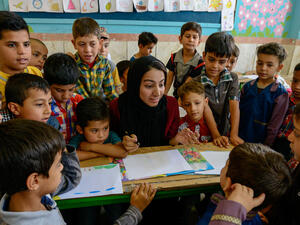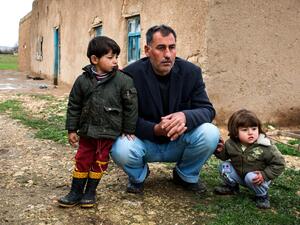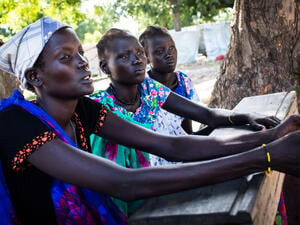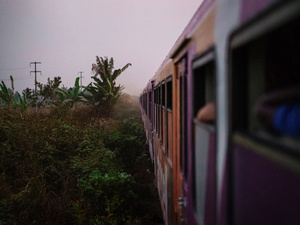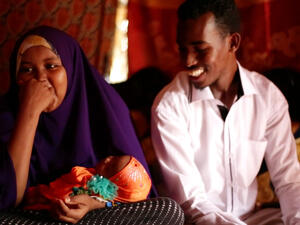Spontaneous returnees reap profits in DRC's Equateur province
Spontaneous returnees reap profits in DRC's Equateur province
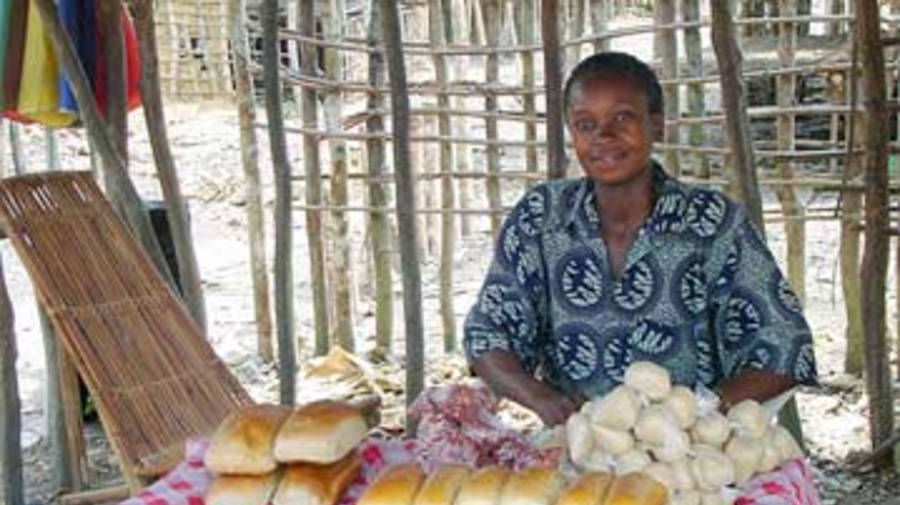
Lili Lobanda returned spontaneously to her home in Democratic Republic of the Congo's Equateur province and set up a thriving bakery business. Her example could inspire others to return with UNHCR help.
BUBURU, Democratic Republic of the Congo, September 11 (UNHCR) - As UNHCR prepares to expand its operation aimed at helping returnees rebuild their lives in Equateur province, Lili Lobanda is proof of what can be achieved by former refugees in this north-west region of the Democratic Republic of the Congo (DRC).
And the experience of people like Lili who have made a go of things after returning spontaneously to the villages of Buburu and Bomongo could encourage others to come back under a UNHCR programme of assisted repatriation due to begin in the area later this month.
Within three months of returning home from seven years of exile in neighbouring Republic of Congo, the single mother of two children has formed a successful cooperative with other returnee women in Buburu village.
The dynamic 29-year-old Lili works every day from five in the morning to late at night making bread, which she sells in her small shop and to other women vendors in this village. Everyone makes enough money out of the arrangement to feed their families and rebuild their lives.
"I began this mainly to feed my children," said Lili, who fled across the Oubangui River in 1999 to escape fighting that left a swathe of death and destruction in Buburu. Feeling secure in her livelihood, she now plans to find a husband.
As Lili looks to the future, UNHCR is opening a new transit centre in Buburu so that it can help other refugees return to this area. The agency's new operation should be fully up and running by the end of the month. Primary and secondary schools have already been built, while another school and a health centre are being renovated.
UNHCR expects some 2,700 more refugees to return to the Buburu and Bomongo areas from Republic of Congo by the end of the year, joining almost 7,400 people who have returned to Equateur province this year - most with UNHCR assistance.
The agency plans - with the aid of local non-governmental organisation AIDES - to help members of the returning community rebuild their lives and, like Lili, earn a living. Income-generating projects will be a key part of the UNHCR vision for the area, which will focus on activities that benefit the whole community.
Working through AIDES, UNHCR has implemented successful income-generating projects elsewhere in Equateur, including soap factories, manioc mills, bakeries, carpentry shops and tailors' shops in the towns of Gemena and Libenge.
In these enterprises, returnees were given equipment and raw materials after setting up associations with members of the local community. "There are plans to set up similar income generation projects in Buburu," said Jackie Aziza, head of community services at AIDES, adding that they had identified 60 fishing and agricultural associations as potential recipients of assistance. Also under consideration are proposals for a manioc mill, a soap factory and a bakery.
"Return and reintegration projects mean considerable support to the area," noted Seibou Insa, head of the UNHCR field office in Equateur. "It benefits not only the returnees to DRC, but also the community as a whole," he added.
Spontaneous returnees like Lili and Philomene Boleke have shown that there are plenty of opportunities for refugees to make a success of things in Buburu and nearby Bomongo. Philomene buys and sells bread baked by Lili as well as running a guesthouse and a small pharmacy. "Business is doing well," she said. "I'm very happy to be home."
Her husband, a former English-language teacher from the area, had dreamed about opening a guesthouse while living in exile. He, Philomene and their five children raised the necessary capital by working the plot of land they were allocated in Republic of Congo.
More than 24,000 Congolese refugees have been repatriated with UNHCR assistance this year from the Republic of Congo, Tanzania, Zambia and Sudan. With the opening of the Buburu office, their numbers are likely to swell as more people return to rebuild their lives.
By Amber Phalen in Buburu, Democratic Republic of the Congo



